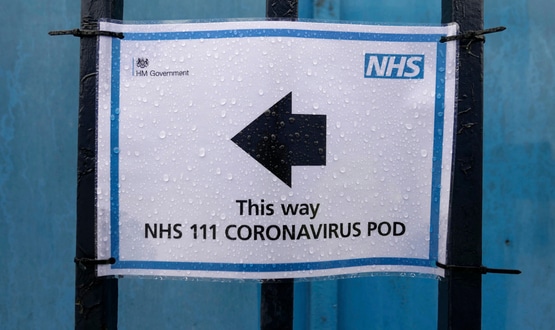Recovering Covid-19 patients given devices to spot dips in oxygen levels

Those recovering from Covid-19 are to be given devices which can help spot dips in their blood oxygen-levels while they recover at home.
The NHS is trialling the use of oximeters, combined with an app, which will make it easier to spot whether people need to be re-admitted to hospital.
The new oximeter service is being tested with more than 150 patients in sites on Watford, Hertfordshire and north London.
The trial has involved NHSX working with British digital health start-up, Huma, formerly known as Medopad.
Clinicians in ‘virtual wards’ are able to track patients’ vital signs – including temperature, heart rate and blood oxygen saturation – in near real-time, receiving alerts if they suggest a patient is deteriorating so that further assessments and care can be arranged.
The service, which began in April, has since been extended to additional sites in West London, with plans for further pilots in other areas of the country including higher-risk patients who have recently tested positive for Covid-19.
If the trials show the model to be safe and beneficial for patients they could help to inform a national roll-out ahead of the coming winter.
Tara Donnelly, chief digital officer of NHSX, said: “This is a great example of how new technology is supporting healthcare professionals to provide the right care at the right time. With Covid-19, it’s vital that we make use of digital tools that can help support patients who don’t need immediate hospital care and allow close monitoring of their condition.
“The feedback we are getting from patients is that the remote monitoring with clinical oversight is really reassuring to them, and they are grateful to be at home while they recover, rather than in a hospital bed.
“The clinical team is finding it helps give them very rapid feedback on their patients and they are able to keep an eye on a number of people at a glance, which is working much better for them than the previous system which relied on phone calls.”
NHS England has also pledged to help cystic fibrosis patients aged six years and over, by giving them a spirometer to measure their lung capacity, and an app that lets them share this information with their doctor.
Health and social care secretary, Matt Hancock, added: “Technology has been an incredibly powerful tool in our response to coronavirus. We have learned so much about what can be done online, and in some cases what is better done that way. Technology will play a growing and vital role in the future.
“While we restore face to face NHS services too, new innovations will ensure patients can benefit from the comfort of home, with the reassurance that they can be fast tracked to support from the NHS should they need. NHS at Home will help keep people safe and out of hospital while providing the best possible care.”





1 Comments
I read recently that Fitbits have a pulse oximeter actually built into them. Apparently, that’s what the flashing green light is. However, it hasn’t been surfaced in the app yet, due to regulatory and legal concerns – it’s a big jump from fitness tracker to medical device. Anyone know anything more about this?
Comments are closed.